Column: Seeds & Stems
There’s a lot to learn from growing a garden, and a lot of Ann Arbor’s schools are finding that out.
Gone are the days when plant studies meant each student sprouted a lone bean seed in a Styrofoam cup. Now students as young as 5 are planting vegetable gardens and watching them grow.
“It’s, like, cool to see things grow,” says Yonatan Hodish, 13, a seventh grader at Ann Arbor Open @ Mack.
I visited garden projects at three Ann Arbor schools – Ann Arbor Open, Bryant Elementary and Burns Park Elementary – to see how tending a garden is helping kids learn. Though much of the growing season is ahead of us, students were able to harvest some early crops before leaving on Friday for summer vacation. Volunteers will tend the gardens over the summer, but kids will return in the fall to see how the foundation they laid this spring has paid off in edibles.
The garden at Ann Arbor Open is in a former sand lot located between Miller Road and a tennis court, along the now-closed driveway and not far from the school’s butterfly garden and a native plants area.
The sand provided a good base for the garden, says teacher Aina Bernier, but it needed a lot of compost and manure before students could start planting there.
Seventh- and eighth-grade students work in the garden as an elective, and in addition to planting, weeding and harvesting, they do experiments, such as planting old seeds to see how they’ll grow, or treating plants differently – less or more water, less or more sun – to see how they’ll do.
Griffin Roy, 13, likes gardening at school. “Having a garden at home is kinda like fun,” he says, “but with friends at school it’s much better, in my opinion, because you can socialize.”
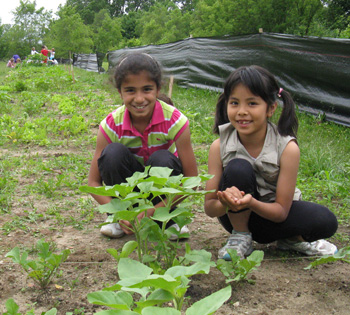
Amani Imran, left, and Rina Ishida, both 7, stayed behind to finish up weeding their class's garden plot at Bryant Elementary School. (Photos by the writer.)
At Bryant Elementary School, students literally had a long row to hoe this semester.
First a strip of ground was plowed up in a large field up a small hill near the school. Then students set to work picking the rocks out of the bed and laying out 17 plots, each about 2 yards square, one for each class.
But the gardens still weren’t ready for planting, because “Mrs. K wasn’t happy with the soil,” says Bryant second-grade teacher Jeanne Kitzmann, making fun of her own insistence. Students had to put in topsoil and composted manure to get the soil in shape before seeds and seedlings could go in the ground.
Kitzmann, who grew up on an Iowa farm, had her second grade sow radishes, lettuce, watermelon and sunflowers. They had a radish harvest several weeks ago and a salad party before the end of the academic year Friday. Not bad for students of 7 or 8 years.
“One of the best things about working in the garden is that it fit into every grade level,” says Kitzmann. Kindergartners were learning about soil, first graders about plants and weather, second graders about plants.
And when Kitzmann’s class was picking rocks out of the soil, they were studying geology in the classroom. When they were measuring out the plots, they were using the metric measurements they were learning in school.
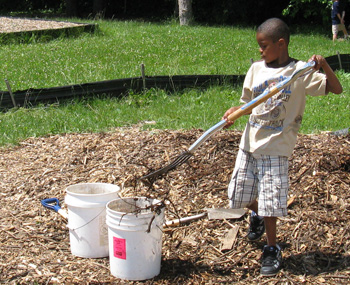
Second-grader Anthony Walker, 7, fills buckets with wood chips to spread on the walkways at the Burns Park Elementary garden.
Students at Burns Park Elementary School started their own garden this year, too. By the end of the school year, kindergarteners were tending sunflowers and morning glories, hoping the two rows will intertwine into a green arch by the time classes start again in the fall. When this year’s first graders return as second graders, they should be able to see how the three types of beans they planted have climbed their three stick-and-twine teepees that were set up this spring.
In the past few weeks, the third graders planted popcorn, which was just starting to poke out of the ground when the academic year ended. Fourth graders have two large beds with pumpkins and honeydew melons.
And since they won’t be back in September – they’re moving on to middle school – the fifth graders worked on the lettuce and radishes, which were harvested before the end of the school year.
Every Thursday, students could spend their recess working in the garden. Students worked on their own class projects or helped with other beds, including tomatoes, potatoes, strawberries, flowers and a row of raspberries.
Parent Lynda Norton estimates that up to 150 students regularly showed up on Thursdays, spending time recording the temperature, looking for bugs and pulling weeds, instead of playing on the nearby playground equipment.
Like many gardens, the 5,000-square-foot garden is much bigger than what was originally planned, says Norton. The idea was to start small, maybe a third of what is there now. “We had a plan,” she says, “then it morphed.”
Students laid out the beds, hauled wood chips and compost and made signs for the rows of vegetables. But parents have gotten just as involved.
They did the heavy lifting – amending the hard clay with compost, building raised beds and some of the structures, such as the strawberry bed. Parents volunteered their time helping the students in the garden, and there have been a number of donations from families, including some stepping stones dropped off near the fence recently.
And now that summer is here, there is a waiting list of families who are volunteering to do watering, weeding and harvesting at the garden.
Though the garden isn’t even a year old, it looks established, with a fence built with the help of a grant from the Ann Arbor Public Schools Educational Foundation, and a neat shed, purchased with a grant from Lowe’s, that shelters gardening tools and garden diaries of some of the students.
Last week, a number of students in the garden during recess headed for the watering cans or spray bottles. Those with spray bottles spent some time watering fellow students instead of the plants. But others made sure their flowers and vegetables got some hydrating.
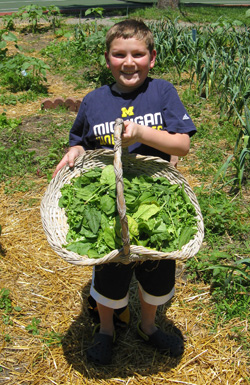
Thirteen-year-old Alex Schmidt, a seventh grader, shows off the lettuce he picked in the garden at Ann Arbor Open @ Mack on Thursday.
At Ann Arbor Open, watering is just as popular an activity in the garden – last week, that meant making some mud to squish around in – but students really liked seeing how much everything grew over the final weeks of school, especially when they returned after a week away and found both their vegetables and the weeds green and lush.
Not everything grew so well. Early in the spring, 13-year-old Madeline Qi and her friends planted radish seeds packaged about 15 years ago. As might be expected, they didn’t grow very well. Even the radishes that grew from the newer seeds had some problems. “Our poor radishes,” Qi says. “We kept pulling them up to look at them.”
But she has hopes for the pumpkin vine, so she’ll be back over the summer to check out its progress. “I have never grown a pumpkin before,” she says, “so I want to see how it does.”
Bernier says students are encouraged to come out and see how the garden is doing this summer, and she’ll email everyone if something is ready to be harvested.
Eighth grader Marley Beaver, 14, was out on the last day of school helping with the lettuce harvest. She’ll be going to Skyline High School next year and the worst thing, she says, is that “they don’t have a garden there.”
On the last day in the garden last week, the sun was shining and there was a breeze when the students came out to harvest lettuce for end-of-the-school year salads.
You know the answer to this question already, but it was posed to 12-year-old Fiona Powell: In the last days before school is out for the summer, would you rather be sitting inside or out in the garden?
“Definitely,” she says, “out here.”
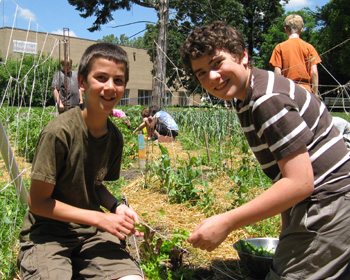
Seventh-graders Ben Van Dijk, left, and Sam Lewis, both 13, harvested lettuce in the garden at Ann Arbor Open @ Mack at the end of the school year.
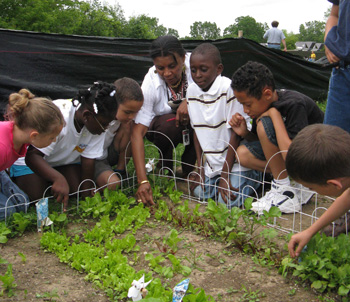
From left to right: Taylor Hanback, 7; Shyanne Wilson, 7; Daniel Dotson, 8, second-grade teacher Cheryl Ervin; Aboulaye Sylla, 8; Michael Davis, 7; Omar Mohammad, 7; and Ezra Conway, 7, take a close look at the lettuce in their garden plot at Bryant Elementary School.
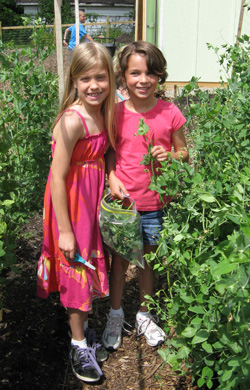
Third-graders Claire Bott, left, and Callie Hastie, both 9, pick peas in the Burns Park Elementary garden.
About the writer: Marianne Rzepka, former reporter for the Ann Arbor News and Detroit Free Press, is a Master Gardener who lives in Ann Arbor and thinks it’s fun to turn the compost pile.





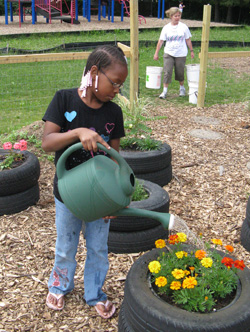
Home plants were really a nice topic to discuss. I would think the ability to grow your own healthy food would be a major priority for our future generations.
Now I’ve been mentioned twice here!